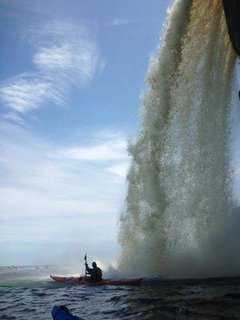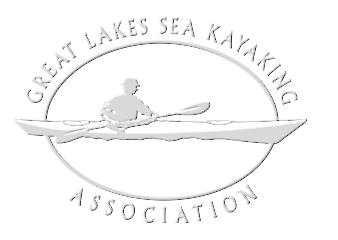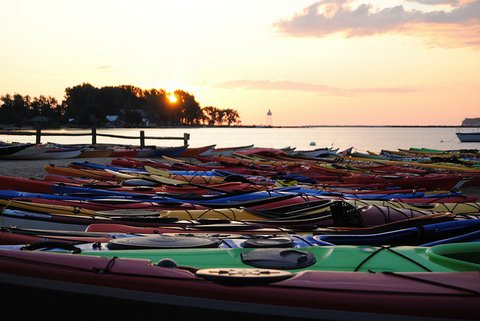by Gerry Felsky

The Symposium was attended by about 160 kayakers of all ability levels from Wisconsin, Ohio, Michigan, Minnesota, and farther afield. About 40 of the participants were coaches and instructors, many of whom are certified through the American Canoe Association (ACA).
The weekend is structured similarly to the GLSKA Rendezvous. We arrived early to get a good campsite, and then signed up for a variety trips and on-water instruction. Social gatherings, activity registration, on-land instruction and presentations take place in the community centre, which is 50 metres from the campsite. This building also houses products for sale from the sponsors, Kokatat, Werner, PH&N, and the organizers, Down Wind Sports outfitters.
On the first day we drove about an hour to Munising for a trip to Grand Isle. There was a 3 hour delay due to thunderstorms, but the clouds parted after lunch, and about 26 of us had an interesting paddle around the cliffs, caves and waterfalls of the island.
We both decided to take advantage of the instruction for the rest of the weekend. Seven sessions were scheduled for 9:00-11:30 a.m., and another seven from 1:00-4:00 p.m. each day. These took place in the sheltered bay of Grand Marais, putting in at the beach just 200 metres from the camping area. Flags were set on the beach so people could find the right class, and meet their instructors. The sign-up sheets were not meant to limit attendance to any one course. Rather they were used by the organizers to move resources to ensure a high ratio of instructors to paddlers.
Classes ranged from Boat Control, Forward Stroke, Bracing, Rescue and Rolling. The water was chilly, but Kokatat loaned out dry suits for the day to people who needed them. Not only were the instructors very skilled, but they were patient and responsive to each individual’s needs. I was reminded of things I’d forgotten (leg and arm placement in self-rescue), and learned and practised new techniques (e.g. heel hook assisted rescue). The cold water and occasional winds helped push the envelope for some who had only experienced milder conditions.
I also picked up numerous gear tips. One very simple, but important, change came from an instructor who suggested I move my whistle from my PFD main zipper to a pocket zipper. This was to avoid the unintended opening of the PFD if the whistle caught on the deck during a rescue. In a similar vein, many instructors had a large carabineer on the shoulder strap of their PFDs. When they ditch, they immediately hook their skirt to the carabineer. This presents a smooth surface to the deck and keeps gear from getting fouled on the deck rigging. I have also taken steps to keep my deck more clear, and have moved my spare paddle to the bow.
Other events during the weekend included a wine and cheese party, boat demos, beach bonfire, rolling demo, and lunchtime lectures. The final evening was a Pasty Dinner (featuring an Upper Peninsula specialty consisting of a meat and potato pie), followed by a presentation on an expedition to paddle around Lake Baikal in Russia.
I highly recommend GLSKS for anyone, at any level, who wants an introduction to Lake Superior paddling and to improve their skill level and safety on the water. The cost was $225 for the weekend (plus camping). I found this extremely good value given the amount and quality of the instruction offered.
This article appeared in the Autumn 2013 issue of QAYAQ

